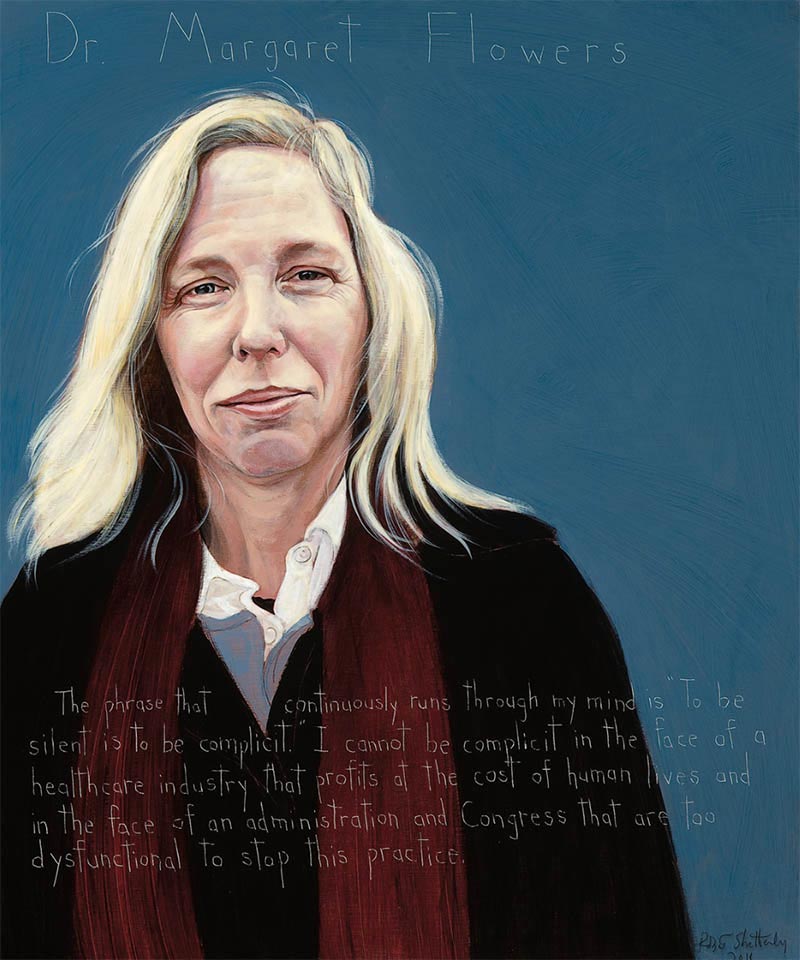
Dr. Margaret Flowers
Pediatrician, Activist for Universal Health Care : b. 1962
“The phrase that continuously runs through my mind is ‘To be silent is to be complicit.’ I cannot be complicit in the face of a healthcare industry that profits at the cost of human lives and in the face of an administration and a Congress that are too dysfunctional to stop this practice.”
Biography
Imagine choosing pediatrics as a profession to “give children a great start, a healthy start…”, then leaving the profession because you weren´t allowed to give children the care they needed due to restrictions imposed by the health insurance industry. Healthcare reform activist, Dr. Margaret Flowers made that choice several years ago. She felt forced to leave the “art” of medicine, as she calls it, to become an advocate for a single-payer insurance system.
Dr. Flowers did her medical training at Johns Hopkins, and began her career in pediatrics as a hospitalist in a rural hospital. A hospitalist, she explains, works exclusively in the hospital, seeing patients, admitting them, recommending treatment, and monitoring progress.
Flowers became increasingly frustrated with the health insurance administrators who, with no medical training, were telling her how long a patient could stay in hospital, regardless of her recommendation. She decided to switch to private practice, but encountered the same issues there. Insurance companies were refusing to pay for certain tests or medicines that Dr. Flowers recommended for her young patients. As she explained in an interview with Bill Moyers, “It didn’t make sense. It wasn’t based on what the patients need. It was based on what the insurance companies could get away with”
At a meeting with the practice manager, Flowers had her “eureka” moment when she and the others caregivers were informed that in order to stay in business, only one healthy child could be seen a day. Each doctor would have a quota of children that had to see every hour. If a parent tried to discuss more than one issue about his/her child, they would have to make a second appointment. Flowers would not be allowed to spend the time she deemed necessary with both parents and children. It was all about money, and “That just wasn’t why I went into medicine.”
And so, Dr. Margaret Flowers got out of medicine and into the fight for a better healthcare system. She joined Physicians for a National Health Program, becoming a Congressional Fellow and opening a chapter in Maryland. She and other physicians in the organization advocate for a single payer insurance system–an expansion of Medicare to cover everyone. In 2009, she was arrested at a Senate Roundtable on Health Insurance for standing and speaking up on behalf of the single payer option, as no representative for that type of insurance was invited to the roundtable discussion. She said in an interview on being arrested, “Our first goal was to have a seat at the table….If we couldn’t get a seat, at least we could expose the insincerity of the current attempt at healthcare reform and show that single payer was actively being excluded.”
The next year, Flowers wrote a letter to President Obama, explaining her position on healthcare and offering Medicare as a model for a better system. She and a colleague stood outside of the White House, trying to get someone to come get the letter. They were told they had to mail the letter. They tried again the next day, and were turned away again. No one was going to come and take Flowers’ letter. Instead of leaving, they insisted and were arrested.
Today, Dr. Margaret Flowers remains a powerful voice for single payer insurance, and is involved in the Occupy movement. Although she no longer practices medicine, she continues to be committed to improving people’s lives with better healthcare.
Programs
Americans Who Tell the Truth (AWTT) offers a variety of ways to engage with its portraits and portrait subjects. Host an exhibit, use our free lesson plans and educational programs, or engage with a member of the AWTT team or portrait subjects.

Education
AWTT has educational materials and lesson plans that ask students to grapple with truth, justice, and freedom.

Exhibits & Community Engagement
AWTT encourages community engagement programs and exhibits accompanied by public events that stimulate dialogue around citizenship, education, and activism.